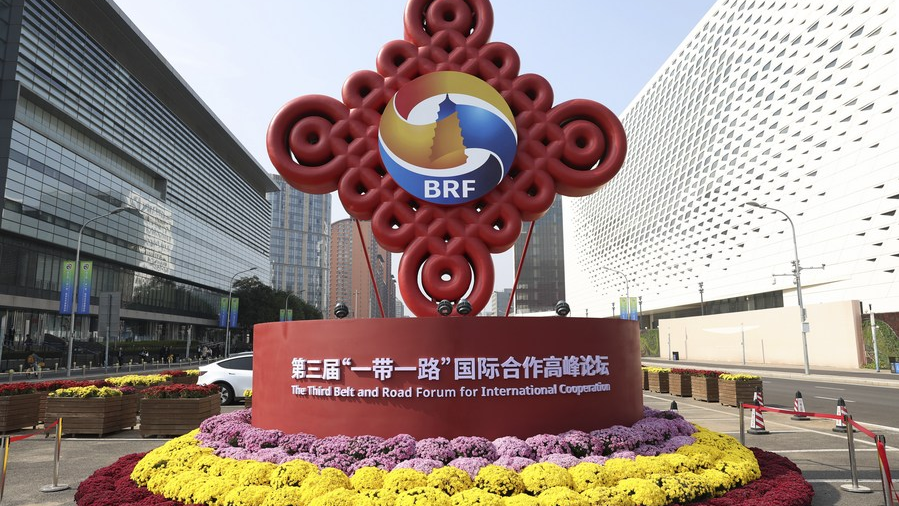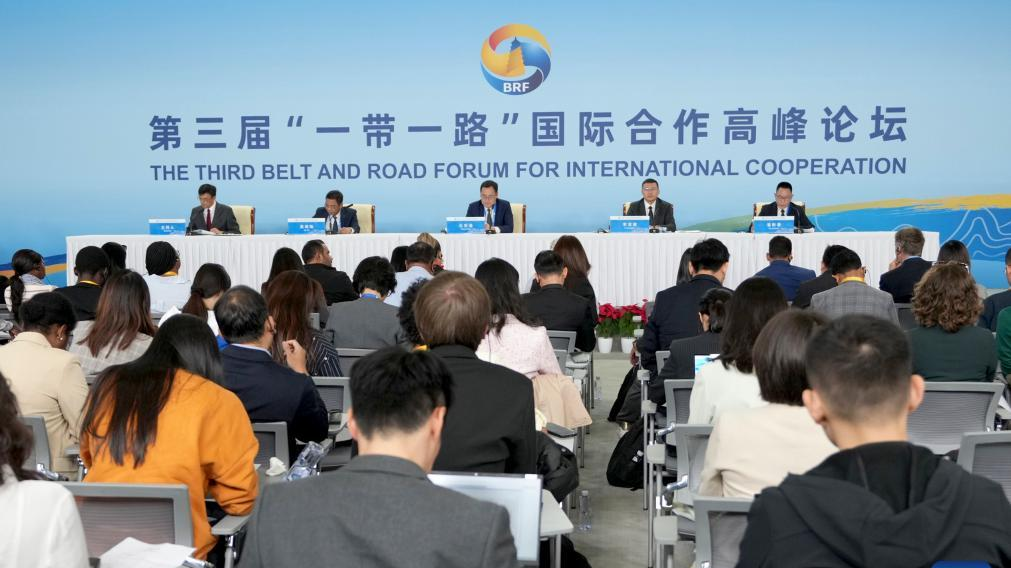
A decoration for the third Belt and Road Forum for International Cooperation near the China National Convention Center in Beijing, capital of China, October 17, 2023. /Xinhua
A decoration for the third Belt and Road Forum for International Cooperation near the China National Convention Center in Beijing, capital of China, October 17, 2023. /Xinhua
Editor's note: Khalid Taimur Akram, a special commentator on current affairs for CGTN, is the executive director at the Pakistan Research Center for a Community with Shared Future, Islamabad. The article reflects the author's opinions and not necessarily the views of CGTN.
The recently released white paper entitled "The Belt and Road Initiative: A Key Pillar of the Global Community of Shared Future," outlines that the Belt and Road Initiative (BRI) represents a monumental effort to reshape international economic cooperation and has become a platform for global development based on resilience and vigor.
This initiative has evolved from a concept into a tangible reality, gaining recognition worldwide as both a public good and a platform for cooperation. The BRI embodies the ancient Silk Road's spirit of cooperation, inclusivity, and mutual benefit. While China initiated the project, it is designed to benefit the entire world, beyond cultural, ethnic, and ideological differences. It aligns with China's commitment to peaceful development and the ideal of global harmony, offering a contemporary solution to promote peace, development, and win-win cooperation.
It has worked a lot in the development of economic globalization for the development of all countries. China, as an active participant in economic globalization, has contributed to global economic stability and open markets. The BRI, in alignment with the UN 2030 Agenda for Sustainable Development, aims to create more dynamic, inclusive, and sustainable economic cooperation, ensuring the benefits of cooperation are shared more equitably across the world.
The main goal is to create a global community of shared future, emphasizing mutual political trust, economic integration, and cultural inclusiveness. By promoting extensive consultation, joint contribution, and shared benefits, the initiative has encouraged countries to participate on an equal footing, fostering a harmonious coexistence where all nations uphold principles of openness and inclusiveness while opposing protectionism, unilateralism, and hegemony.
Paving the way towards shared development and prosperity
The BRI operates on the principles of extensive consultation, joint contributions, and shared values, promoting broadening cooperation and economic integration and stressing the importance of all countries participating equally, contributing to the shared objectives, and sharing the resulting benefits. The BRI commits to open, green, and clean cooperation, emphasizing sustainability and zero tolerance for corruption, and creates a global network of partnerships based on shared responsibility and collective participation, fostering a more balanced, coordinated, and inclusive global economic landscape.
The BRI not only advances economic development but also offers a path to peace, prosperity, and openness. By promoting peaceful development, shared prosperity, and collaboration beyond geopolitical calculations, it contributes to a world that respects each other's sovereignty, dignity, and development path.

The first press briefing in the Media Center of the third Belt and Road Forum for International Cooperation is held at the China National Convention Center in Beijing, capital of China, October 16, 2023. /Xinhua
The first press briefing in the Media Center of the third Belt and Road Forum for International Cooperation is held at the China National Convention Center in Beijing, capital of China, October 16, 2023. /Xinhua
Promoting all-round connectivity in multiple fields
To achieve greater connectivity, the BRI focuses on five key areas: policy coordination, infrastructure connectivity, unimpeded trade, financial integration, and people-to-people ties. By blending "hard connectivity" in infrastructure with "soft connectivity" through rules and standards harmonization, the BRI is becoming the world's largest platform for international cooperation.
The BRI supports regional integration by aligning with international development agendas and plans, creating a comprehensive and multilayered mechanism for policy coordination. This includes regular communication at various levels and platforms, reinforcing diplomatic efforts with the involvement of heads of state, intergovernmental strategic communications, and local and interdepartmental policy coordination.
A multi-tiered and multidimensional infrastructure network is developing based on a framework made up of "six corridors, six routes, and multiple countries and ports." Basic connections via land, air, sea, and cyberspace are in place, setting the groundwork for deeper industrial and trade cooperation as well as enhancing cross-cultural exchanges.
Economic corridors and international connections are being built with great success. The participating nations have advanced the construction, creating a network of infrastructures that links Asia's sub-regions to all continents.
From 2013 to 2022, the cumulative value of imports and exports between China and Belt and Road Initiative (BRI) partner countries reached $19.1 trillion, demonstrating steady growth, attracting significant investment, signing construction contracts, and achieving mutual recognition with partner countries, enhancing customs efficiency.
The BRI has expanded its scope into innovative fields such as health cooperation, green and low-carbon development, and scientific and technological collaboration. These advancements aim to create a healthier, greener, more innovative, and digital Silk Road with the potential to address climate change and global health challenges effectively.
Sustained progress in BRI cooperation
Over the past decade, BRI cooperation has ushered in a new era of global economic growth, international trade, investment, and a path towards modernization for all participating nations, as well as a path towards a hopeful future that offers a wide range of opportunities. It has bolstered the development capacity of participating countries and improved the lives of their citizens while contributing to global governance reforms.
In a world marked by geopolitical challenges and economic uncertainties, the Belt and Road Initiative stands as a beacon of hope and collaboration and a testament to China's commitment to global development, shared values and prosperity. As the BRI continues to evolve and expand, it carries the promise of building a global community of shared futures where countries cooperate for the betterment of humanity, transcending differences in culture, ideology, and systems.
(If you want to contribute and have specific expertise, please contact us at opinions@cgtn.com. Follow @thouse_opinions on Twitter to discover the latest commentaries in the CGTN Opinion Section.)